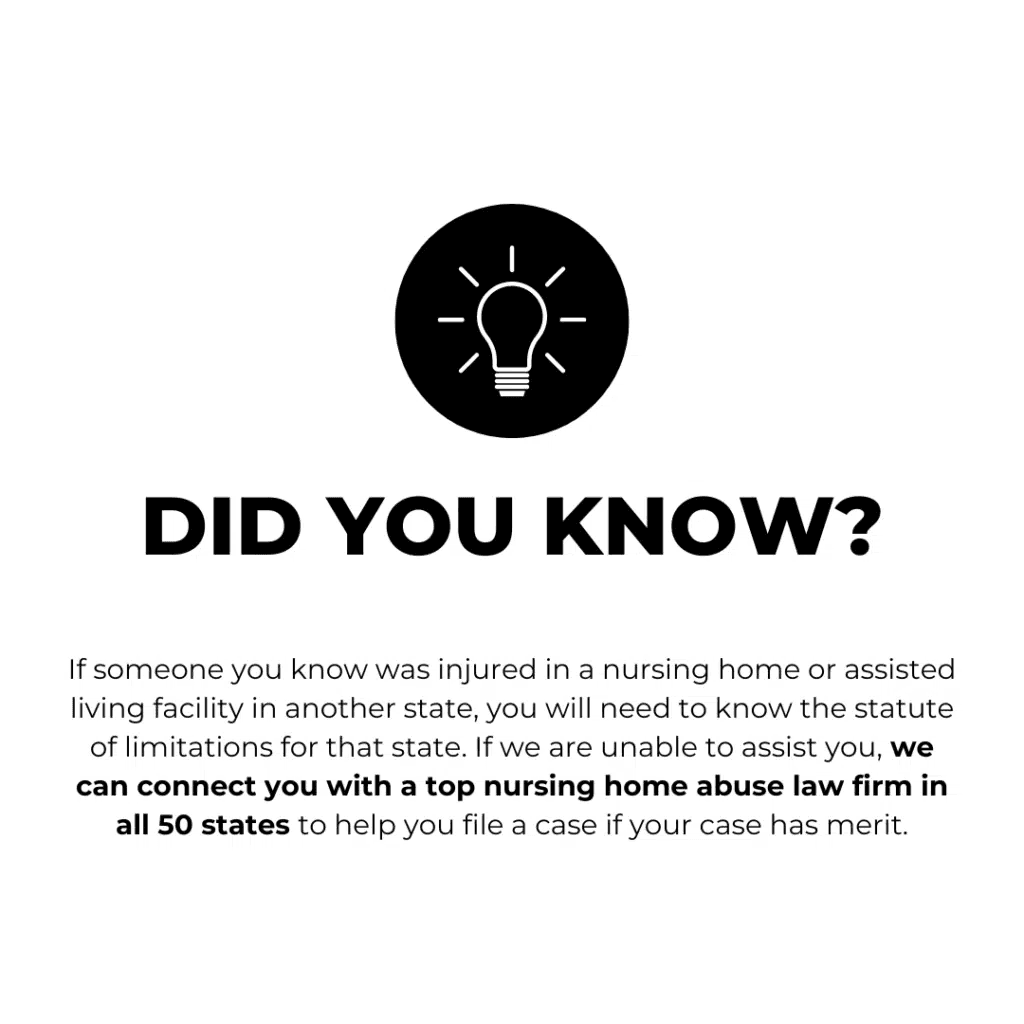
Nursing home abuse and neglect put vulnerable residents at serious risk, leading to malnutrition, dehydration, infections, and preventable injuries. When facilities fail to provide adequate care, residents suffer, and families are left feeling helpless. Lack of supervision, improper medical treatment, and unsafe conditions can result in devastating harm. Understanding the warning signs, knowing your legal rights, and holding negligent facilities accountable are crucial steps in protecting your loved ones. Learn how to take action and seek justice.
November 5, 2024
3 min
Discovering that someone you care about might be getting hurt or not taken care of properly in a nursing home can be upsetting. Nursing homes are supposed to be safe places where people get the help they need, but sometimes this is not the case.
If you suspect that someone in a nursing home or assisted living facility is being abused, you must take the proper steps to ensure they are safe. You might feel worried and have a lot of questions. That’s normal, and it’s important to get help from people who know what to do.
At Michael Hill Trial Law, we understand how serious this is and how important it is to get justice for your loved one. Our team of lawyers care about helping people who need it most.
Here we have some of our most frequently asked questions and we hope to answer them to the best of our ability.
It is important to recognize that nursing homes are notorious for not reporting abuse and neglect, which we have written about previously.
Nursing home abuse and neglect are defined by federal law, which applies to all nursing homes across the United States, no matter where they’re located. It’s important to note that intent or malicious intent isn’t required to show abuse or neglect. Both terms mean that a nursing home resident hasn’t been given the care or services they need.
Abuse means not giving a resident the things they need to stay physically, mentally, and emotionally well. There are different kinds of abuse a resident might face:
Neglect means not providing residents with the care they need to stay healthy and safe. This includes basics like food, water, cleanliness, medical treatment, and making sure they’re safe from harm. Types of neglect include:
Signs of abuse and neglect in nursing homes can vary, but family, friends, and caregivers must recognize them. Here are some signs to watch out for:
Recognizing these signs early can help protect residents from harm and ensure they receive the care and support they need.
If you suspect abuse in a nursing home, it’s essential to approach the situation with composure. Start by speaking with the staff and management. Express your concerns calmly and respectfully. Make sure to allow them to address any issues you’ve noticed. Listen attentively to their explanations and ask clarifying questions to gain a comprehensive understanding of the situation. We have previously written about how to report nursing home abuse and neglect.
Throughout these discussions, make detailed notes of the information provided by the staff and any observations you make during your interactions. Documenting this information will not only help you remember key details but also serve as valuable evidence if further action is needed.
After you speak with the staff, it is important to discuss it with your loved one. Create a safe space for them to share their experiences and concerns openly. Reassure them of your support and commitment to their well-being. Take notes of any allegations or worries they express, ensuring accuracy and detail.
By documenting both your conversations with the staff and your private discussions with your loved one, you should have a good record of the situation. This documentation will enable you to evaluate the severity of the concerns and determine the necessary next steps to address the suspected abuse effectively.
If abuse or neglect is suspected, seeking legal advice becomes crucial. Taking legal action not only protects the resident but can also prompt necessary changes within the facility. In situations where abuse or neglect has occurred, the resident is protected by the law and might be able to receive compensation. Depending on your relationship with the resident, you might also have the right to seek compensation. While it’s important to report abuse and neglect, taking legal action is often necessary to force nursing homes to change their practices. Doing so can significantly impact the nursing home financially and ensure they uphold residents’ rights.

The nursing home negligence statute of limitations is like a deadline for filing a lawsuit if someone gets hurt. Each state sets its time limit, usually between one to six years, which you can read about here. These limits help ensure people don’t wait too long to take legal action and allow enough time to gather evidence.
If someone is hurt in a nursing home, they usually have about a year to file a lawsuit. But figuring out the right time limit can be tricky, especially because it varies from state to state. Also, the rules might change over time, and there could be exceptions, like if the abuse was hidden or the person was too sick to file a claim.
If you’re not sure about the time limit for your case, it’s essential to talk to a lawyer. They can help make sure you don’t miss the deadline to file a lawsuit. If you miss it, you might not be able to take legal action at all. Talking to a lawyer can help you understand and meet this deadline, ensuring you can seek justice for your loved ones.
Our legal services operate on a contingency fee basis, meaning you won’t be charged upfront. Instead, our fee is contingent on us winning your case. If we secure a settlement or verdict on your behalf, we’ll receive 40% of the total amount as payment for our services. Additionally, any costs associated with the lawsuit are covered by our firm and reimbursed from the settlement or verdict.
Should your case not result in a successful outcome, you won’t owe us anything for our services or the litigation expenses. Even if we’ve invested significant time and resources, totaling thousands of hours and potentially exceeding $100,000, we absorb those costs. Our confidence in our services reflects our commitment to you, and it’s why we’re selective in the cases we take on.
Recognizing and addressing nursing home abuse and neglect is paramount for ensuring the safety and well-being of our loved ones. By understanding the signs of abuse and neglect, taking appropriate steps to report suspicions, and seeking legal advice when necessary, we can advocate for those who may be vulnerable. Additionally, knowing the timeframe for filing a nursing home abuse lawsuit and understanding the payment options for legal services can help individuals navigate this complex and often challenging process. At Michael Hill Trial Law, we are committed to providing support and guidance to those in need, advocating tirelessly for justice and accountability in cases of nursing home negligence.
Disclaimer: This information is provided for informational purposes only. Nothing in this article should be construed as providing legal advice or the creation of an attorney client relationship. Laws are updated frequently and change from state to state. If you desire legal advice, you can contact Michael Hill Trial Law at www.protectseniors.com, send an email to info@protectseniors.com, or call (800) 659-2712 to begin an investigation or contact another attorney.